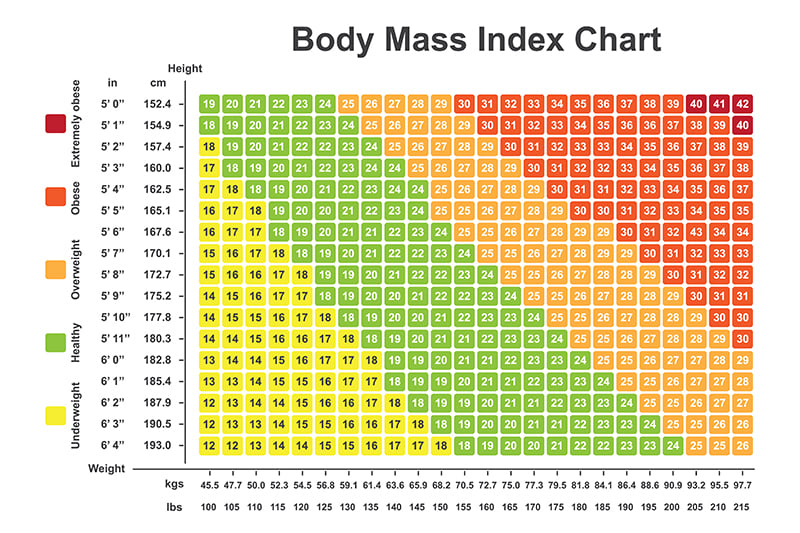
Reviewed and Updated: March 21st, 2025
We already know how important weight loss is for heart health, feeling great and looking great. But one of the less often discussed benefits is how weight loss benefits your bones and joints.
Losing Weight Might Decrease Joint Pain

Losing weight may alleviate joint pain, especially in the knees. According to Johns Hopkins Arthritis Center, being only 10 pounds overweight increases the force on the knee by 30-60 pounds with each step. All of this extra force on one’s knees can lead to premature breakdown of knee cartilage. In the worst cases, knee cartilage can be come so degraded that there is bone on bone friction.
Consequently, even a small amount of weight loss may provide a great deal of pain relief along with helping you to preserve your mobility and range of motion.
Weight Loss May Decrease Inflammation
Another risk factor for bone and joint problems is inflammation which can interfere with injury healing, increase fracture risk and accelerate joint degradation.
[READ: Inflammation’s Effect on Bone Health]
Along with antioxidants, weight loss is a top way to fight off inflammation. In this publication on PubMed, researchers found that overweight individuals generally present with higher levels of hormones such as leptin, visfatin, and resistin. All three of these hormones are associated with increased inflammation and other negative health effects such as increased insulin resistance, and diabetes. On the other hand, leaner individuals were found to have anti-inflammatory markers (lower inflammation risk).
Excess body weight adds stress on the joints, especially on the knees and hips. This increased stress can cause wear and tear on cartilage, leading to inflammation, pain, and deterioration over time. Losing weight is beneficial to reduce the pressure on the joints, leading to decreased mechanical strain and inflammation associated with joint degeneration. A study found that even a modest weight loss of 5% reduced knee pain and improved function in people with osteoarthritis.
It Could Go Some Way in Preventing Osteoarthritis
Osteoarthritis is a degenerative condition that occurs when the protective cartilage that cushions the ends of the bones wears down over time. It most often affects the joints in your hands, knees, hips and spine. Consequences include pain and stiffness that can limit movement and range of motion.
Weight loss could help prevent or delay osteoporosis in a few ways.
- We’ve discussed how much extra force even 10 extra pounds adds to one’s knees. Losing those ten pounds was shown to decrease osteoarthritis risk by 50% in this study. The wear and tear on cartilage can lead to degradation and as a result, greater risk for osteoarthritis.
- Insulin resistance and metabolic syndrome are linked with chronic low-grade inflammation in the body, including the joints. Weight loss improves insulin sensitivity, helping to reduce systemic inflammation, including the reduction of inflammation in the joints. Improved insulin sensitivity shows a lower C-reactive protein (CRP) levels, a marker of inflammation which contributes to the reduction in joint inflammation.
- Excess weight contributes to a web of diseases (obesity, type 2 diabetes, heart disease, and other issues) known together as metabolic syndrome. Unfortunately, there’s growing evidence that osteoarthritis is a part of metabolic syndrome.
Decrease Chances of a Gout Attack
Lower Uric Acid Levels and Chance of Gout Attack. A 2017 analysis of 10 studies, published in Annals of Rheumatic Diseases, found that weight loss was beneficial for obese or overweight people with gout. Gout is a form of arthritis that causes intense pain, redness, and swelling in the affected joints. The most common affection is to the big toe, but it can also impact ankles, knees, wrists, and elbows. This condition occurs when uric acid levels rise and cause urate crystals build-up in the joints, triggering severe inflammation and discomfort. Overall, people who lost weight had lower serum uric acid levels and fewer gout attacks.
How Much Weight Should I Lose?

For overweight or obese individuals, doctors recommend starting with a modest goal of 5-10 pounds. Long term, it’s good to aim for a BMI of 18.5 to 24.9.
Of course, if you’re already at this BMI or even underweight, this won’t necessarily apply.
Bottom Line
Being overweight can have negative effects on your bone and joint health in a number of ways. It can directly affect them through putting more load on joints but long term makes inflammatory conditions worse. As a result, even modest weight loss results in a great deal of benefits from decreased joint pain, decreased inflammation, better mobility and increased range of motion.








Validate your login
Sign In
Create New Account